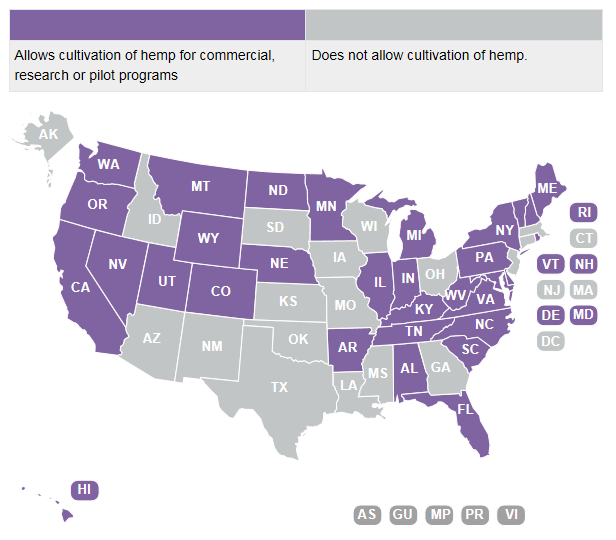State Legislatures Act To Promote Industrial Hemp
Post# of 990

State Industrial Hemp Statutes
State legislatures have taken action to promote industrial hemp as an agricultural commodity in recent years. A wide range of products, including fibers, textiles, paper, construction and insulation materials, cosmetic products, animal feed, food, and beverages all may use hemp. The plant is estimated to be used in more than 25,000 products spanning nine markets: agriculture, textiles, recycling, automotive, furniture, food/nutrition/beverages, paper, construction materials and personal care.
While hemp and marijuana products both come from the cannabis plant, hemp is typically distinguished by its use, physical appearance and lower concentration of tetrahydrocannabinol (THC). Hemp producers often grow the plant for the one or more parts — seeds, flowers and stalk. The plant is cultivated to grow taller, denser and with a single stalk.
Federal Action
President Obama signed the Agricultural Act of 2014, or the 2014 Farm Bill, which included Section 7606 allowing for universities and state departments of agriculture to begin cultivating industrial hemp for limited purposes. Specifically, the law allows universities and state departments of agriculture to grow or cultivate industrial hemp if:
“(1) the industrial hemp is grown or cultivated for purposes of research conducted under an agricultural pilot program or other agricultural or academic research; and
(2) the growing or cultivating of industrial hemp is allowed under the laws of the state in which such institution of higher education or state department of agriculture is located and such research occurs.”
The law also requires that the grow sites be certified by—and registered with—their state.
A bipartisan group of U.S. senators introduced the Industrial Hemp Farming Act of 2015 that would allow American farmers to produce and cultivate industrial hemp. The bill would remove hemp from the controlled substances list as long as it contained no more than 0.3 percent THC.
The U.S. Department of Agriculture, in consultation with the U.S. Drug Enforcement Agency (DEA) and the U.S. Food and Drug Administration, released a Statement of Principles on Industrial Hemp in the Federal Register on Aug 12, 2016, on the applicable activities related to hemp in the 2014 Farm Bill.
State Action
At least 33 states passed legislation related to industrial hemp. State policymakers have taken action to address various policy issues — the definition of hemp, licensure of growers, regulation and certification of seeds, state-wide commissions and legal protection of growers. Some states establishing these programs require a change in federal laws or a waiver from the DEA prior to implementation.
2017 Legislation Update
38 states and Puerto Rico considered legislation related to industrial hemp in 2017. These bills ranged from clarifying existing laws to establishing new licensing requirements and programs. At least 15 states enacted legislation in 2017 — Arkansas, Colorado, Florida, Hawaii, North Dakota, Nevada, New York, Oregon, South Carolina, Tennessee, Virginia, Washington, West Virginia and Wyoming. Florida and Nevada authorized new research or pilot programs. The governors of Arizona and New Mexico vetoed legislation, which would have established new research programs.
State Laws Related to Industrial Hemp

Defining Hemp
State statutes, with the exception of West Virginia, define industrial hemp as a variety of cannabis with a THC concentration of not more than 0.3 percent. West Virginia defines hemp as cannabis with a THC concentration of less than 1 percent.
Many state definitions for industrial hemp specify that THC concentration is on a dry weight basis and can be measured from any part of the plant. Some states also require the plant to be possessed by a licensed grower for it to be considered under the definition of industrial hemp.
Research and Pilot Programs
At least 26 states have passed laws creating industrial hemp research or pilot programs. State agencies and institutions of higher education administer these programs in order to study the cultivation, processing, and economics of industrial hemp. Pilot programs may be limited to a certain period of time and may require periodic reporting from participants and state agencies. Some states establish specific regulatory agencies or committees, rules, and goals to oversee the research programs. States may also require coordination between specific colleges or universities and the programs, in other states coordination is optional. From 2015 to 2016, seven states enacted legislation to create hemp research or pilot programs, including Pennsylvania (H.B. 976) and Hawaii (S.B. 2659).
While industrial hemp research and pilot programs typically focus on studying the cultivation, processing for certain products and economic impacts of hemp, some states have specific guidelines and intended goals. Here are some examples of unique state research goals:
- Colorado S.B. 184 (2014) created an Industrial Hemp Grant Research Program for state universities to research and develop hemp strains that are best suited for industrial applications and develop new seed strains.
- Colorado S.B. 109 (2017) directed commissioner of agriculture to create a group to study the feasability hemp products' use in animal feed.
- Kentucky’s industrial hemp research program studies the environmental benefit or impact of hemp, the potential use of hemp as an energy source or biofuel, and the agronomy research being conducted worldwide relating to hemp.
- The North Carolina Hemp Commission studies the best practices for soil conservation and restoration in collaboration with two state universities.
Licensing, Registration and Permitting
To comply with state regulations for commerical and reserach programs, growers must be licensed, registered or permitted with the state agency overseeing program. Requirements for registration, licenses and permits might include:
- Criminal background checks.
- Periodic renewals, usually every one to three years.
- Registering the location or Global Positioning System (GPS) coordinates of grow sites.
- Record keeping and reporting any sales or distributions including to whom it was sold or distributed, including processors.
- Documentation from the state agency or institution of higher education to prove the grower is participating in an approved program.
The state agencies overseeing these programs are typically authorized to conduct inspections, test the plants and review records. State agencies may revoke licenses and impose civil and criminal penalties against growers who violate regulations.
Seed Certification and Access
Access to viable seed may present a challenge for research programs and commercial growers. To implement commercial and research hemp programs, farmers need access to seeds that are guaranteed to produce plants that fall under the legal definition of hemp. These seeds can be difficult to obtain, however, because hemp is still regulated under the federal Controlled Substances Act. In response to this problem, Colorado’s governor sent a letter to the U.S. secretary of agriculture in 2014 requesting the federal government address hemp seed regulations.
States are taking independent action to regulate industrial hemp seeds. Certified seeds are usually defined as seeds that contain less than 0.3 percent THC or produce hemp plants that contain less than 0.3 percent THC.
At least four states have also established specific licenses or certification programs for hemp seed distributors and producers:
California requires seed breeders to register with their local county agricultural commissioner.
Indiana allows growers who obtain an agricultural hemp seed production license to produce seeds. Licensees may then sell seeds or retain them to propagate future crops.
Maine allows the commissioner of agriculture, conservation and forestry to issue licenses to seed distributors if their seeds are from a certified seed source.
Oregon requires growers who produce hemp seeds capable of germination to register with the Oregon Department of Agriculture if they intend to sell seeds. Growers who wish to retain seeds do not need to register as a seed producer.
Criminal Justice and Legalization
State legislation also has removed hemp from the state’s controlled substances list and exempted industrial hemp from the statutory definition of marijuana if it is grown within specific regulations.
To protect growers from criminal prosecution some states provide an affirmative defense for cannabis possession and cultivation charges under controlled substances law for licensed individuals. States may require licensees to obtain a controlled substances registration from the DEA for the affirmative defense to apply.
For a summary of state laws related to industrial hemp, click on the states in the map below or see the chart for a complete list of state statues.
Note that some states laws establishing commercial industrial hemp programs require a change in federal law or waivers from the U.S. Drug Enforcement Agency before those programs can be implemented by the state.
Source...
 (0)
(0) (0)
(0)